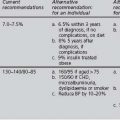CHAPTER 6 LIVING WITH DIABETES
MENTAL HEALTH
Interestingly, the evidence underpinning the new indicators has been challenged. A Cochrane review concluded “that routine feedback of the results of screening to clinicians results in a marginal increase in the rate of diagnosis of depression. However, patients’ outcomes are not improved at 6–12 months as a consequence of screening”. The review also concluded that the sceening test fails to meet the National Screening Committee’s criteria for the test, the treatment and the screening programme (see Chapter 1) (Gilbody et al 2006).
Cognitive behaviour therapy is also useful in treating depression, but is less effective in diabetics with complications (Lustman et al 1988).
DRIVING
LEGAL PROVISIONS
The current guidelines are regularly updated and found on the Driver and Vehicle Licensing Agency’s (DVLA) website: http://www.dvla.gov.uk/at_a_glance/ch3_diabetes.htm). This also provides contact details for the DVLA.
The Road Traffic Acts require that diabetics (irrespective of treatment) who are either applicants or driving licence holders must notify the DVLA of their condition and of any problems or diabetes complications that develop that may affect the safety of driving. Failure to inform the DVLA is now a criminal offence. For medico-legal reasons, health-care professionals should document in the medical records that they have advised the patient to notify the DVLA. GPs may be contacted by a medical officer from the DVLA with a request for further information (usually a DIAB3 form), such as details about glycaemic control (particularly the risk of hypoglycaemia), visual problems and any limb problems.
Group I (ordinary) licence holders and applicants on insulin are granted a licence up to 3 years. On renewal they are required to make a self-declaration that may lead to medical enquiries. Those treated with diet and tablets or diet alone are permitted to hold a licence valid to 70 years of age, subject to the conditions and the need to report any change to insulin treatment. For Group 1 (ordinary) licence holders and applicants, a questionnaire (Diabetic 1) needs to be completed (downloadable: http://www.dvla.gov.uk/drivers/dmed1_files/pdf/diab1.pdf).
Since 1991, diabetics on insulin have been banned from applying for and renewing thereafter a Group 2 (bus, coach and large goods vehicle driver) licence. Diabetics on diet alone or diet and tablet treatment are permitted to hold a Group 2 licence, subject to the absence of any relevant disability and to not being on insulin. Also, drivers with insulin-treated diabetes should not drive emergency vehicles, due to “… the difficulties for an individual, regardless of whether they may appear to have exemplary glycaemic control, in adhering to the monitoring processes required when responding to an emergency situation” (DVLA 2006).
INSURANCE
If an insurance company asks about diabetes, then the applicant must inform the company if he is diabetic. Failure to do so and also to notify the DVLA can invalidate cover in the event of a claim.
MEDICAL PROBLEMS THAT MAY AFFECT DRIVING
Patients and professionals need to be aware of the following that can affect driving:
EMPLOYMENT
Diabetes UK has produced a useful booklet, Employment and diabetes.
FINDING A JOB
Diabetics on insulin are still not allowed to be in the following occupations:
Since October 2004, blanket bans have been lifted for diabetics joining the police, fire and ambulance services, but applicants need to demonstrate that their diabetes is well controlled (with hypo-awareness), regularly monitored, and free of complications. The minimum levels of physical and mental fitness are still necessary for all applicants.
Any diabetic is entitled to be considered for any employment for which he is otherwise qualified. UK (via the Disability Discrimination Act) and European legislation offer protection against discrimination in employment against individuals with a medical condition such as diabetes. Due to a lack of up-to-date knowledge about diabetes, employers may fear that a diabetic poses a potential safety risk to the employer and/or the public. Most diabetics can manage their condition so that there is minimal risk of incapacitation from problems such as hypoglycaemia (ADA 2007). Employers need to consider whether the individual’s qualifications and medical circumstances (the condition, its treatment and any specific risks or problems) can be matched to the job specification. The Disability Rights Commission provides useful information for both employers and workers with long-term conditions such as diabetes.
Changing working hours
Working shifts can increase the risk of developing either metabolic syndrome or type 2 diabetes (Knutsson 2003). Altering working hours, such as changing shifts or working overtime, can disrupt eating and sleeping patterns in people with pre-existing diabetes, and may lead to a worsening of glycaemic control, particularly if the rotation pattern is rapid. Increased physical activity can affect blood glucose levels, and may require adjustments in calorific intake and treatment to maintain reasonable glycaemic control. Physically demanding work at unexpected times increases the risk of hypoglycaemia.
The following advice may be useful to diabetics working odd hours:
INTERCURRENT ILLNESS
The following advice should be given to diabetics who become unwell:
TRAVEL
Pre-travel planning is essential and involves obtaining essential information, ensuring current optimal diabetic management and having in place all the necessary arrangements. Health-care professionals and organisations, such as Diabetes UK and the NHS Scotland (on its website, www.fitfortravel.scot.nhs.uk), can provide useful information.
Stay updated, free articles. Join our Telegram channel

Full access? Get Clinical Tree





